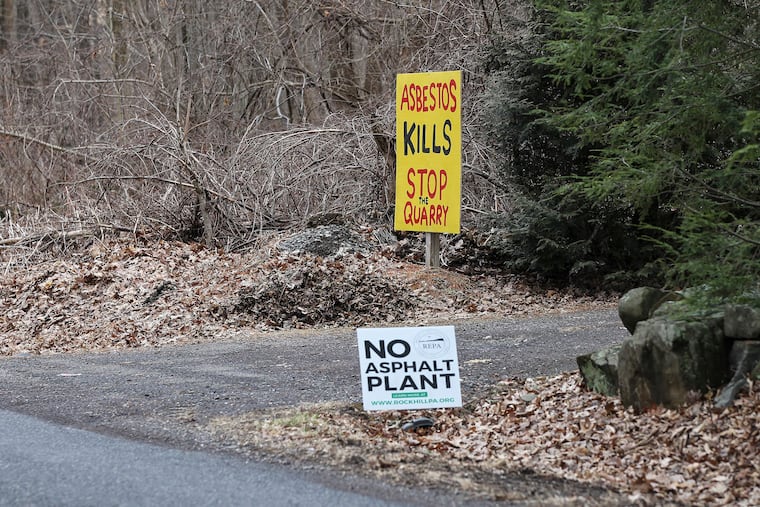Asbestos naturally occurs in the rock at a Bucks County quarry. An operator wants to mine there.
Activity at the Rockhill Quarry is temporarily banned while state environmental regulators investigate the risk from naturally occurring asbestos. But after unauthorized activity at the quarry, area lawmakers call for a permanent closure.

When Dan Soliday was a kid in the 1960s, he and his friends sometimes played at the expansive quarry near his home in East Rockhill Township, Bucks County. Now, he’s scared for his 3-year-old granddaughter to even play in his yard a quarter mile from the site.
The rock in the quarry contains naturally occurring asbestos, regulators discovered in December 2018. As a new operator seeks to begin mining, crushing rock, and running an asphalt plant in the long-dormant Rockhill Quarry, residents like Soliday worry about asbestos dust being carried out on truck tires, settling on leaves or grass, and making its way into their lungs.
Quarry operations at the site are temporarily banned until the state determines the risk of asbestos exposure. But last week, the Pennsylvania Department of Environmental Protection discovered the quarry operator, R.E. Pierson Materials, was moving rock materials around the quarry without authorization. And on Monday, a court in Doylestown is expected to begin considering the township’s challenge to the planned asphalt plant. Residents plan to protest the quarry outside the Bucks County Courthouse.
“We know that there is asbestos in that rock,” State Sen. Steve Santarsiero (D., Bucks) said at a news conference Friday with Rep. Brian Fitzpatrick (R., Bucks), calling for the quarry to permanently close. “A residential community has grown up around this site. We know that families day in and day out live their lives in close proximity.”
» READ MORE: As reports of asbestos in Philly schools pile up, teachers union calls for ‘rapid-response’ team in the district
The quarry, in the northwest corner of the county, is the only one in the state known to have asbestos within such a heavily populated residential area, Santarsiero said. When disturbed, asbestos becomes airborne and can be inhaled; the fibers can cause mesothelioma, a deadly form of cancer. The asbestos in the quarry can be released into the environment “if the rock is broken, crushed, or frayed,” the Pennsylvania Department of Health wrote in a Feb. 7 letter to local activists. Naturally occurring asbestos “is best to be avoided and left alone," it said.
Owned by Hanson Aggregates PA, the quarry opened in 1976. But for the last 30 years, it had been essentially dormant, and a neighborhood grew around it; 11,000 children attend school within a five-mile radius, activists said.
In 2017, R.E. Pierson Materials became quarry operator with a contract for construction projects for the Pennsylvania Turnpike. Its operating plans, including processing 1,000 tons of rock per hour, were approved, though its surface mining permit needs to be revised, according to the DEP. The township has appealed the approval of R.E. Pierson’s rock-crusher plan to the state environmental hearing board.
“There’s no safe level of breathing of asbestos. Whether it’s manufactured asbestos like you see in the schools throughout Philadelphia ... or naturally occurring asbestos, it’s all harmful,” said Soliday, director of the community nonprofit Rockhill Environmental Preservation Alliance. He raised two sons with his wife in the East Rockhill home they bought in 1989.
The state ban on quarry work will be in place until the DEP finishes its review. Last week, the DEP ordered the company to stop the unauthorized work. It is now considering penalties.
“Determining the risk of naturally occurring asbestos and the potential quarrying of it is the very question DEP is working to answer and why we issued a cessation order on the quarry until we have what we need to make that determination,” said DEP spokesperson Virginia Cain.
Hanson Aggregates, the quarry owner, has been ordered to retest its samples using a different methodology because its first samples yielded inconsistent results compared with the DEP’s sampling.
» READ MORE: Missed asbestos, dangerous dust: How Philadelphia’s Ben Franklin H.S. project went wrong
In a statement, Hanson said its testing has not found asbestos in air samples near the work area perimeter, and questioned the accuracy of claims by officials and residents.
The presence of the asbestos “does not specifically equate to an inhalation risk,” said Jeff Sieg, a company spokesperson. “There are no indications of unsafe levels of asbestos in the air, and no indications that employees or the surrounding community have been, or are currently, at risk due to the quarry.”
Sieg said the company is committed to its mitigation plan and wants to meet with Santarsiero and Fitzpatrick to “show the stringent safety and environmental controls that are in place.”
Slavic Mokienko, vice president for R.E. Pierson Materials, the quarry operator, did not return a request for comment.
At Friday’s news conference, Fitzpatrick said the company was trying “to take advantage of citizens who feel that they don’t have a voice" and that he had been disappointed in its response to the issue from Hanson and other stakeholders.
He has asked the Environmental Protection Agency to conduct a geologic investigation, air sampling and monitoring, and a dust-control program to stop asbestos from being emitted or tracked into public areas.
The EPA has previously said that it can’t intervene because the quarry isn’t in a residential area. Locals disagree.
“Pennsylvania’s right to clean air is protected under the law, and blasting asbestos in a residential neighborhood would be a clear violation of those rights,” Katie Zackon, a Rockhill Environmental Preservation Alliance leader, said at the news conference.
The Bucks County Commissioners also called for the quarry to be closed in a Feb. 19 letter to the DEP and state Department of Health, saying the potential risk to workers and citizens was “too great to allow operations at the quarry to continue.”